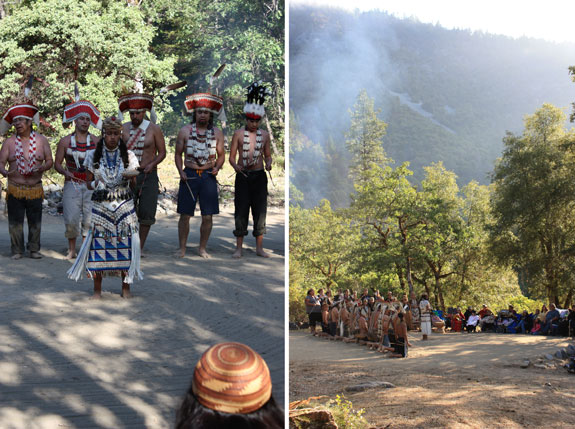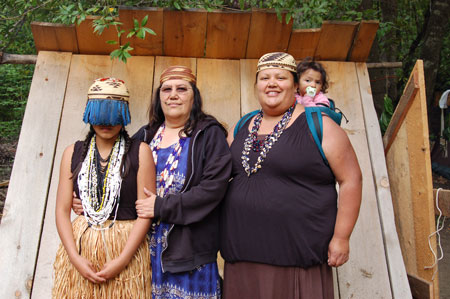 My name is Ty’ithreeha Allen and I am sixteen years old and I had my Ihuk ceremony when I was twelve years old. I grew up attending flower dances, which are coming of age ceremonies held for girls who have become young women. My mom was pregnant with me when the first flower dance, or Ihuk as we call it in the Karuk language, was held again after not being held for over eighty years, so I have grown up attending the dance. I have always attended this and other ceremonies my entire life, and have grown up dancing, learning, and practicing my culture. My family and I prepared for my Ihuk for two years before the actual ceremony took place, all of this prepared me for my Ihuk and to enter womanhood. The Ihuk ceremony has always been very special to me, it is the only ceremony where everybody gets to dance and sing together. Throughout the ceremony, I prayed and worked hard so that I would become a strong young woman. Everyday older women would take turns to come to visit with me, talk to me, and give me words of advice that I could use throughout my life. The Ihuk ceremony was not only for me, but my family and community was able to experience it with me.
My name is Ty’ithreeha Allen and I am sixteen years old and I had my Ihuk ceremony when I was twelve years old. I grew up attending flower dances, which are coming of age ceremonies held for girls who have become young women. My mom was pregnant with me when the first flower dance, or Ihuk as we call it in the Karuk language, was held again after not being held for over eighty years, so I have grown up attending the dance. I have always attended this and other ceremonies my entire life, and have grown up dancing, learning, and practicing my culture. My family and I prepared for my Ihuk for two years before the actual ceremony took place, all of this prepared me for my Ihuk and to enter womanhood. The Ihuk ceremony has always been very special to me, it is the only ceremony where everybody gets to dance and sing together. Throughout the ceremony, I prayed and worked hard so that I would become a strong young woman. Everyday older women would take turns to come to visit with me, talk to me, and give me words of advice that I could use throughout my life. The Ihuk ceremony was not only for me, but my family and community was able to experience it with me.
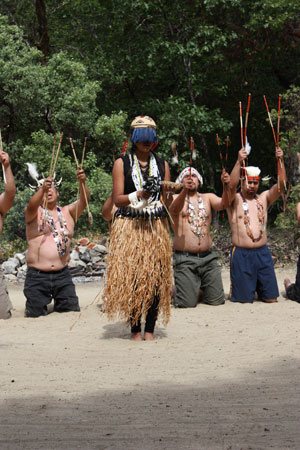 After my Ihuk ceremony, I wanted a way to share my experience with others, so I began to work on a digital story with my mother. I knew it was important to share with others why we have the Ihuk ceremony and what it was for. I did my video a year after my ceremony had taken place, and my thoughts have continued to evolve as I get older. I like that I was able to capture my thoughts right after the dance and it is an amazing thing to be able to look back on. My Ihuk ceremony has helped mold me into the woman I am becoming, and the prayers, songs, words of advice and experience stay with me everywhere I go and keep me working towards the woman I want to become.
After my Ihuk ceremony, I wanted a way to share my experience with others, so I began to work on a digital story with my mother. I knew it was important to share with others why we have the Ihuk ceremony and what it was for. I did my video a year after my ceremony had taken place, and my thoughts have continued to evolve as I get older. I like that I was able to capture my thoughts right after the dance and it is an amazing thing to be able to look back on. My Ihuk ceremony has helped mold me into the woman I am becoming, and the prayers, songs, words of advice and experience stay with me everywhere I go and keep me working towards the woman I want to become.
— Ty’ithreeha Allen (Karuk/Yurok), 16 years old
Passing on traditions and culture from one generation to the next is both an honor and a responsibility that we hold as cultural practitioners. As a parent, you hope that these traditions and cultural practices help to teach the next generation not only how and why these things are done, but more importantly, you hope that it passes on the values and things you believe are most important about being a member of your family, tribe, or community. When my own daughter had the opportunity to have an Ihuk Ceremony, or Karuk Flower Dance, the opportunity to pass on traditions, practices and values took on a whole new meaning. I was fortunate to have been brought up in a family who had been active in the revitalization and cultural renaissance that occurred in Northern California in the 1960’s and 1970’s, and had grown up participating in the ceremonies. I have also been a mentor in our Karuk Women’s Dance Camp teaching other young women about the dances for many years, but with the re-introduction of the Flower Dance in our community, I would now have the opportunity to support my daughter in this ceremony and pass on culture not only to the next generation, but to support my own daughter through this experience in a way that has not been done for many generations. This experience was one for which I will forever feel blessed, thankful, and it strengthened my commitment to ensuring that our cultural traditions, practices, and values are carried on for our future generations.
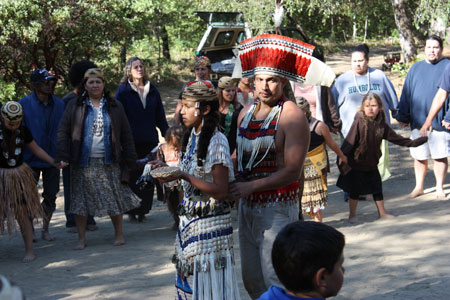 The Ihuk Ceremony brings together the young girl’s family and community to make luck and medicine for her as she transitions into becoming a young woman. This is one of the few ceremonies when an entire family can dance and sing together, and in comparison to some of the other larger, community dances, this one is somewhat smaller and more intimate. I think that this setting provides for an experience that impacts not only the young girl, but also each member of her family and community who comes out to support her during this time. I know that a special connection was made with the older women who came and spoke with her, with her sisters, cousins, and friends who sang and danced for her and with each of the other women who supported her during this time in various ways. That is to be expected given the nature of a coming of age ceremony for women. But what also made it special was to see the connection that she made with her grandfather, father, uncles, and male cousins during this time. To see the two genders each working together and supporting one another, honoring and celebrating the different roles and responsibilities that we each have, lends itself strongly to ensuring that the balance we seek as “fix the earth” people will continue to grow and be a strong part of our ceremonies and community into the future. Like many of the families we have talked to who participate in celebrating their young woman with this ceremony, the changes it makes for the entire families have been so positive. For some families, it has reconnected them with other ceremonies and we have seen many of the same faces return year after year to help make luck and medicine for other young girls. It has become so ingrained in our lifestyle, that my younger daughter and little nieces are shocked when they ask me about my flower dance and I tell them that I didn’t have one. It makes me happy that for them, this ceremony is a part of their reality.
The Ihuk Ceremony brings together the young girl’s family and community to make luck and medicine for her as she transitions into becoming a young woman. This is one of the few ceremonies when an entire family can dance and sing together, and in comparison to some of the other larger, community dances, this one is somewhat smaller and more intimate. I think that this setting provides for an experience that impacts not only the young girl, but also each member of her family and community who comes out to support her during this time. I know that a special connection was made with the older women who came and spoke with her, with her sisters, cousins, and friends who sang and danced for her and with each of the other women who supported her during this time in various ways. That is to be expected given the nature of a coming of age ceremony for women. But what also made it special was to see the connection that she made with her grandfather, father, uncles, and male cousins during this time. To see the two genders each working together and supporting one another, honoring and celebrating the different roles and responsibilities that we each have, lends itself strongly to ensuring that the balance we seek as “fix the earth” people will continue to grow and be a strong part of our ceremonies and community into the future. Like many of the families we have talked to who participate in celebrating their young woman with this ceremony, the changes it makes for the entire families have been so positive. For some families, it has reconnected them with other ceremonies and we have seen many of the same faces return year after year to help make luck and medicine for other young girls. It has become so ingrained in our lifestyle, that my younger daughter and little nieces are shocked when they ask me about my flower dance and I tell them that I didn’t have one. It makes me happy that for them, this ceremony is a part of their reality.
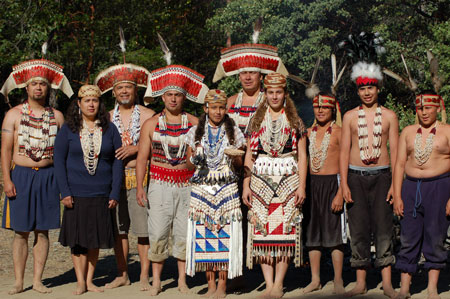 After spending ten days on the river preparing for and taking part in the Ihuk Ceremony with my daughter, our family, our spiritual family, friends and community, I feel good about the future generations and know that our traditions, practices, and values will continue to grow and thrive. And as we prepare to support another young girl later this month on her journey into womanhood, my heart is happy and full.
After spending ten days on the river preparing for and taking part in the Ihuk Ceremony with my daughter, our family, our spiritual family, friends and community, I feel good about the future generations and know that our traditions, practices, and values will continue to grow and thrive. And as we prepare to support another young girl later this month on her journey into womanhood, my heart is happy and full.
— Pimm Allen (Karuk/Yurok)
